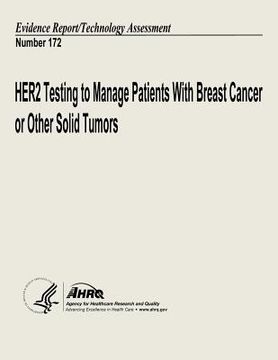HER2 Testing to Manage Patients With Breast Cancer and Other Solid Tumors: Evidence Report/Technology Assessment Number 172 (in English)
Synopsis "HER2 Testing to Manage Patients With Breast Cancer and Other Solid Tumors: Evidence Report/Technology Assessment Number 172 (in English)"
The human epidermal growth factor receptor-2 (HER2) gene is amplified and the HER2 protein overexpressed in approximately 18-20 percent of breast cancer cases. Amplification or overexpression of HER2 is associated with poor prognosis. Evidence from randomized trials demonstrates that adding trastuzumab, a therapeutic monoclonal antibody that targets HER2, to adjuvant chemotherapy regimens for HER2-positive breast cancer improves survival. HER2 also is overexpressed in other epithelial malignancies such as ovarian, thyroid, lung, salivary gland/head and neck, stomach, colon, and prostate cancers. This report is a systematic review of the evidence on other applications of HER2 testing to the management of cancer patients including: potential for response to trastuzumab among breast cancer patients who have negative, equivocal, or discordant HER2 assay results; use of HER2 assay results to guide selection of breast cancer treatments other than trastuzumab (i.e., chemotherapy regimen or hormonal therapy regimen); the use of serum HER2 to monitor treatment response or disease progression in breast cancer patients; and use of HER2 testing to manage patients with ovarian, lung, prostate, or head and neck tumors. The concordance and discrepancy of HER2 measurement methods are discussed in a narrative review. This systematic review will address five key questions regarding HER2 testing to manage patients with breast cancer or other solid tumors: What is the evidence on concordance and discrepancy rates for methods (e.g., FISH, IHC, etc.) used to analyze HER2 status in breast tumor tissue? 2. For patients who are not unequivocally HER2 positive, what is the evidence on outcomes of treatment targeting the HER2 molecule (trastuzumab, etc.), or on differences in outcomes of a common chemotherapy or hormonal therapy regimen with versus without additional treatment targeting the HER2 molecule, in: a) Breast cancer patients characterized by discrepant HER2 results from different tissue assay methods performed adequately; and b) For those with HER2-negative breast cancer? 3. For breast cancer patients, what is the evidence on clinical benefits and harms of using HER2 assay results to guide selection of: a) Chemotherapy regimen; or b) Hormonal therapy? 4. What is the evidence that monitoring serum or plasma concentrations of HER2 extracellular domain in patients with HER2-positive breast cancer predicts response to therapy, or detects tumor progression or recurrence, and if so, what is the evidence that decisions based on serum or plasma HER2 assay results improve patient management and outcomes? 5. In patients with ovarian, lung, prostate, or head and neck cancers, what is the evidence that: a) Testing tumor tissue for HER2; or b) Monitoring serum or plasma concentrations of HER2; either predicts response to therapy, or detects tumor progression or recurrence; and if so, what is the evidence that decisions based on HER2 assay results improve patient management and outcomes?

